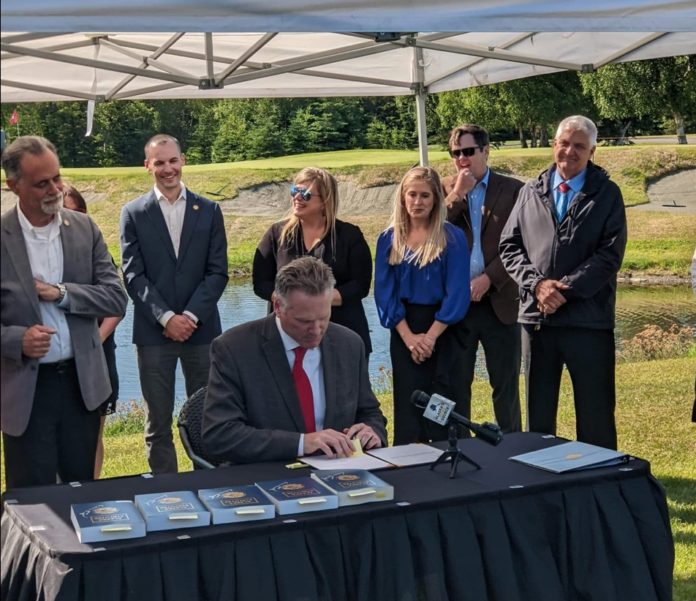Alaska on Thursday overhauled its alcohol laws, the largest reform in 40 years. With a stroke of Gov. Mike Dunleavy’s pen and under the eager gazes of nearly 20 legislators, Senate Bill 9, the legislation sponsored by retiring Senate President Peter Micciche, became law at O’Malleys on the Green in Anchorage.
“This is a journey that is 10 years in the making and over 16,000 volunteer hours from the public to make a reality,” said Sen. Micciche to the crowd. “Everyone here will see the results of this hard work, and Alaskans and visitors to Alaska will be the better for it.”
Senate Bill 9 passed with near unanimous support in both the House and the Senate. For the past eight sessions, the bill, also known as the “Title 4 Rewrite” (after the title in the Alaska statute books that alcohol laws are housed), seemed to be on a path of inevitable passage. During those same eight years, the bill was to come up short of the needed votes. Each time, the House floor was the final resting place for the rewrite effort.
The changes in law are sweeping, ranging from how events are managed (live music is now allowed in breweries) to the basic functions of businesses (liquor stores can now make deliveries and provide samples of alcohol onsite). The Alcohol Beverage Control Board, which oversees the enforcement of alcohol laws, anticipates the regulatory process for implementing Senate Bill 9 to be the largest package in its history.
Alaska’s alcohol laws are notoriously complicated and divisive. The state’s saloon and boomtown history of abuse, combined with the highest levels of alcoholism per capita in the nation, garnered enough public support in the early 1980’s to have laws that ‘dried out’ some of the unwanted activity.
That temperance-focused system had the added effect of stifling new entrants into various Alaska communities, creating a lucrative market for existing licensees. The laws passed in the 1980s could not foresee the enormous popularity of locally brewed beers and local craft distilleries.
As breweries took off in towns of all sizes, and restaurants and liquor stores (called technically ‘package stores’) looked for expanded practices, the same refrain came back: Do not open up Title 4, because then there will be open war with incumbent license holders and new entrants into the alcohol industry.
With so many large projects, contrary groups came together to compromise and strike a deal. Alaska CHARR, the lobby which represents primarily bars, restaurants, and distributors, came to an accord with the Brewers Guild of Alaska, as well as the alcohol treatment groups that historically opposed any expansion of alcohol consumption.
That compromise rested on a bedrock assumption that the laws governing alcohol, written when the state was slightly over 20 years old, needed significant revision to comport with the reality of a world with different tastes from the early-Reagan era. Staff from the local consulting group Agnew-Beck were employed to develop a framework for that rewrite. By 2015, the bill was ready to launch. The coalition had approached Sen. Micciche, now into his third year in the Legislature and already a prominent voice, to spearhead the initiative.
But opponents had powerful friends in Juneau. Bar owners could count on the assistance of two freshmen who owned bars of their own: Democrat Adam Wool of Fairbanks and Republican Louise Stutes of Kodiak, as well as sympathetic ears from Gabrielle LeDoux of East Anchorage. That opposition killed the reform in the final hours of the 2016 legislative session.
This process was repeated again in the 2018 session, thanks to LeDoux, Wool, and Stutes being in the majority.
Notoriously, a poison pill was placed into the reform bill that would have devastated breweries. The pill did its job: the bill died before it could even have a vote in the House.
By 2020, the obstacles to the Title 4 Rewrite appeared to have opened. Stutes had committed to not opposing the bill going to the floor, and LeDoux was effectively ostracized for other actions (LeDoux was indicted by the Department of Law for election fraud, and her trial date is to be set early next month). Wool had effectively been outvoted even within his Democratic caucus.
But then, the spring of 2020 was disrupted by the Covid-19 virus arriving from China. The Legislature ended business faster than at any time in the state’s history, and scattered its membership to their districts to wait out the virus. The rewrite of Title 4 was a victim of circumstance.
Nothing was left to chance this time. Although by now he was Senate President, a position from which personal bills are often held as leverage, Sen. Micciche nevertheless embarked on the alcohol rewrite.
In the final days of the legislative session, the dam finally broke. The House voted on Senate Bill 9. The Senate agreed to the House’s changes with hours left before the mandatory end of the Legislature’s business.
As in the celebration for the Alaska Reads Act earlier this month, Thursday’s ceremony was filled with an upbeat atmosphere with attendees. Partisan differences were set aside, with hard liberals like outgoing Rep. Ivy Sponholz and ultra conservative Sen. Roger Holland looking on for the signing of Senate Bill 9. After nearly an hour of snapping pictures on the green, the party slowly migrated into the clubhouse, where there were definitely drinks available.
